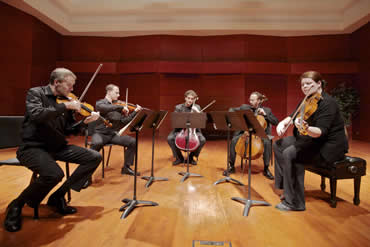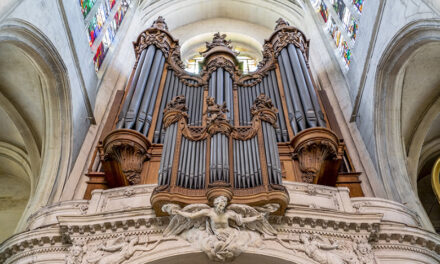It was appropriate that an entire program of vocal and chamber music by Chandler Carter be sandwiched between Long Leaf Opera‘s performances of the composer’s opera Strange Fruit. Such intimate music has long been regarded as a window into the heart and soul of a composer. For a composer of three operas and fifty songs, vocal settings would naturally be a significant feature of his smaller-scaled pieces. The music was well heard in the Paul Green Theatre at UNC.
It is always good to see a fellow Tar Heel do well, and Carter is one in two senses of the term. He is a native of Four Oaks, NC, and he was graduated from UNC Chapel Hill with a Bachelor of Arts degree with highest honors in 1984. After receiving Master of Music degrees in composition and vocal performance from Boston University in 1986, he earned a Ph.D. in composition in 1995 from the City University of New York, where his teachers were Thea Musgrave and David Del Tredici. He is currently Associate Professor of Music at Hofstra University and is building an impressive résumé of awards, grants, and international performances.
In his ability to select good texts and to set the English language to music, Carter reminds me of past masters Virgil Thomson, Benjamin Britten, and the still-creative Ned Rorem. His mastery of writing for instruments was also evident in each selection, in his exploitation techniques and timbre and in his very imaginative combinations of sonorities.
The five parts of Carter’s song cycle Dorothy Parker’s Songs of Love (1988-89), for soprano and piano, portray the gamut of emotions over the course of an unsuccessful love affair, finding the emotional state to have come full circle at the end. Soprano Elizabeth Linnartz sang with a lovely, warm timbre and exceptional diction that made the absence of texts or supertitles acceptable. Throughout the program, the piano part was rendered masterfully and with clean articulation and refined dynamics and phrasing by David Heid. Linnartz received her Doctorate of Musical Arts from UNC Greensboro and is on the faculty of Duke University. I could not find her biography in the otherwise very full concert or program.
The poignant mating call of the presumed last male Bachman’s warbler was the inspiration for Carter’s Song of the Bachman’s Warbler (1996), for cello and piano. The cello plays a motive roughly based on 18-year-old ornithologist John Terborgh’s report of field observations. The bird called in vain for three springs but no female ever answered him. Carter made full use of harmonics and other string methods to convey this vain song against extinction. Heid’s keyboard was perfectly balanced, never covering the cello of Nathan Leyland.
More widely known poetry (including “O Captain, My Captain”) was heard in Four Songs of Walt Whitman composed between 1985 and 1997. Tenor Michael Kilbridge sang these with great care for the words and a pleasing timbre, superbly supported by Heid.
International opera star, soprano Christine Wiedinger brought a voice of more dramatic weight to Carter’s Three Tennyson Settings that included “Crossing The Bar.” Carter’s innovative use of traditional instruments to evoke the sound-world of Zulu music was displayed throughout Bow Songs (1996). These settings for string quartet of traditional South African protest songs, used as interludes in the composer’s opera No Easy Walk to Freedom, are based on the life of President Nelson Mandela. These songs would have been accompanied by a large bow (resonated by the performer’s mouth) that plays only two fundamental pitches a half step apart. This repeated figure is heard in the cello frequently throughout the first of three movements. The players were violinists Anne Leyland and Tasi Matthews, violist Molly Ohah, and cellist Leyland. The writing for the first violin sometimes seemed to sound like country fiddling. The scoring for cello and viola was immediately attractive.
Stuck in Grand Central (1998) is an homage to Stravinsky with references to the Symphony in Three Movements and the ballet Orpheus. The scoring for two flutes and two guitars is certainly extraordinary. Flutists Kristen Shaheen and Kelsey McCarl matched their tone beautifully and played in lock step in frequent duets. It was a real pleasure to hear the guitars of Aaron Prillaman and Chris Adkins played without amplification in an intimate space.
In comments from the stage, Carter said the date of this concert, June 16, was doubly significant. It was the birthday of James Joyce and the anniversary date of the children’s rebellion against the required teaching of the Afrikaans language in Soweto, South Africa, in 1976.
Carter’s most impressive work on the program was his song cycle, Chamber Music (1990), a setting of eleven poems from James Joyce’s 36-poem collection of the same title. They are arranged as solos and duets for soprano and tenor accompanied by an ensemble of five players. Soprano Weidinger and tenor Kilbridge sang against a shimmering tapestry of sounds woven by clarinetist Shirley Violand Jones, cellist Leyland, harpist Winifred Garret, pianist Heid, and hornist Sandy Svoboda, all conducted by the experienced Alfred Sturgis. Both singers sang beautifully with good diction. Supertitles would have helped during a few denser passages. In some early passages, a few notes seemed to lie uncomfortably for the tenor but the last two-thirds were exceptionally well done. One of Carter’s most astonishing touches was accompanying a tenor solo with obbligato horn. The culmination of the work by both singers was deeply satisfying. This song cycle ought to be committed to compact disc. It was sad that there were so few music lovers in the audience.












